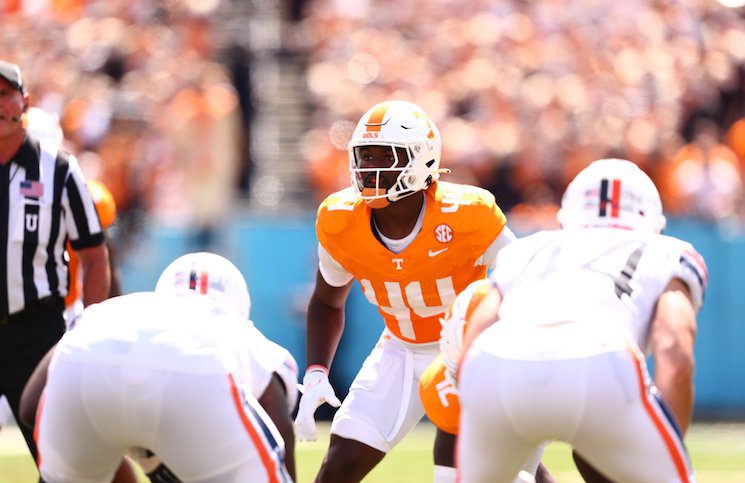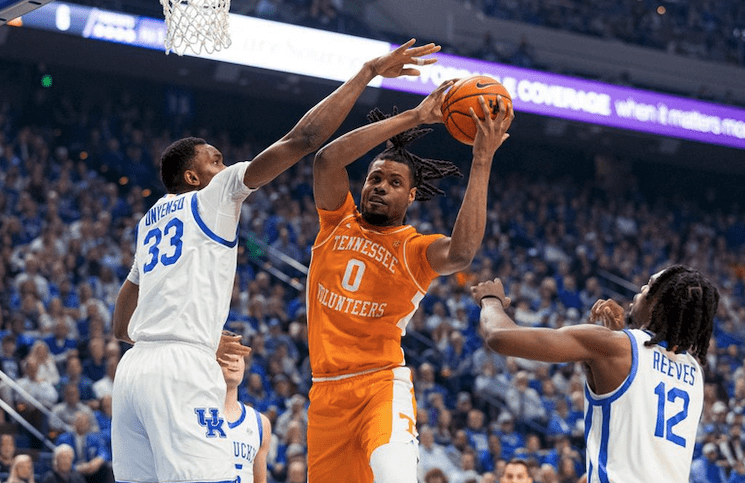Tennessee head football coach Butch Jones has become a lightning rod this offseason. National and local media have discussed ad nauseam Jones’ ability as a coach and whether or not he will ultimately cut it as the Vols’ head coach. But there’s one thing that’s become apparent about those who discuss Jones’ career and aptitude as a coach: There’s very little middle ground in any discussions about Butch Jones.
Most of the discussions online, in articles, on podcasts, and on radio shows about Jones have all taken similar paths: Either you think Butch Jones is an awful coach or you’re “carrying water” for him if you stand up for him. The room for middle ground has disappeared when talking about Butch Jones.
Why is that? Well, I have a theory.
Things like this happen when a head football coach wins but doesn’t “win enough” for fans used to more. And there’s nothing wrong with fans expecting more, especially when the history backs it up. I looked at what are fair expectations for the Vols not too long ago, and 8-4 regular seasons are what the floor should be considering Tennessee’s modern history from 1960 till now.
But “not winning enough” doesn’t make a coach bad. It usually makes him anywhere between average to good.
It’s easy for everyone to point out elite coaches and terrible coaches. Elite coaches such as Nick Saban and Urban Meyer win titles and very rarely lose. College football fans and media would rarely dispute those two aren’t two of the greatest coaches currently in college football. It’s also easy to tell when a coach isn’t cut out for the job he has. Sonny Dykes was let go from Cal after going 19-30 in four seasons as head coach of the Golden Bears. Bob Diaco of UConn was fired after going just 11-26 in his time with the Huskies. Few would disagree with those decisions based on their time at their respective schools.
You can do the same with Tennessee’s own history too.
Phillip Fulmer was a great coach. He won a national title, a couple SEC titles, several East crowns, and won 151 of his 204 games he coached at Tennessee. Conversely, Derek Dooley was not a great coach. He only won four his his 23 SEC games he coached while at Tennessee and was the coach who lost to Kentucky for the first time in nearly three decades.
But where does Butch Jones fit in that spectrum? Somewhere in the middle, most likely. At least based on his track record thus far.
Butch Jones took over Tennessee at arguably its lowest point in program history. He and his various staff members helped quickly rebuild the football team from perpetual 5-7 seasons to back-to-back 9-4 seasons. That kind of work is nothing to scoff at. But as impressive as the turnaround has been, it’s also been marred by second half collapses and failing to hold a season together down the stretch. Yes, injuries plagued last season as did some inexperience in key spots in 2015, but excuses don’t cut it in college football; the praise and blame always falls on the head coach.
So what’s this make Butch Jones? By my estimations, he’s at best a good/solid coach. And there’s nothing wrong with that. But that’s not going to cut it for a good portion of Vol fans who remember the 1990s and early 2000s.
To steal a quote from former Vol receiver and current sports radio host Jayson Swain, there’s a “market for average” for college football coaches. A program that’s used to winning big but has fallen on hard times or a program in need of a rebuild will gladly take an average to good coach to get them out of their hole. And for a program not used to winning big, an average to good coach will be an improvement for them and one fans will be fine with.
But programs with strong histories and championship traditions aren’t long term fits for coaches like that. Average to good coaches can be used as a bridge between a bad era and a return to glory. Sometimes, the coach who brings a team out of the mud is the answer. Nick Saban was that for Alabama. But in many other cases, there’s a coach in between a program’s worst and a program’s best.
Michigan, for example, used Brady Hoke to restock their talent after Rich Rodriguez failed as a head coach. But Hoke proved to not be the long term solution, so they hired Jim Harbaugh who has “next elite college coach” written all over him. Some view Jones in a similar way to Hoke, albeit with a different career trajectory than Hoke thus far.
Butch Jones isn’t a terrible coach. He’s proven that by helping rebuild Tennessee and helping the Vols come back against Georgia (twice) and Florida. But that doesn’t mean he’s a great coach either. Losses to South Carolina and Vanderbilt last year prove that, as do second half collapses against Oklahoma, Florida, and Arkansas in 2015.
That leaves him somewhere in the middle.
The loudest voices in sports media are typically those who are either tearing down something or someone or those who are excessively praising something or someone. The people who take a neutral or moderate approach don’t catch attention because their opinions aren’t extreme enough. In this day and age of social media and the search for brief, instant fame, only hot takes or those on the opposite end of the spectrum get attention. The middle ground has become something many just ignore now.
Opinions are opinions, however. If you think Jones is a great coach or if you think he is a terrible coach, you are entitled to that. But don’t let your opinion blind you to facts and rational conversation, either. Don’t let the practice of civil discussion die.
Butch Jones may not be the best coach Tennessee has ever had, but he’s far from the worst either. There’s still room for the middle ground on Jones, but few care to travel there.





2 Responses
When are sports fans going to wise up and stop paying so much attention to the SPORT’S MEDIA. In my way of seeing things, the SPORT’S MEDIA need to shut up and stop trying to get coaches hired and fired. They are about as bad as the Main line national New Media in that they are now just reporting news often times providing false or fake news. They try to control what happens. An example is like the day I traveling and listening the Colin (or is it Kolin) Cowherd ranting and raving about how the Colts needed to axe Peyton Manning after the year of Peyton’s injury. He was carrying on about how Andrew Luck would be so much better than Peyton going forward. Sure enough the Colts did just what Cowherd was calling for, but look what happened after that – Peyton took Denver to 2 superbowls and won one before retiring. The Sports media don’t always know what they are talking about!
Said before and I’ll say it again, MEDIA LEAVE HIM ALONE !, You incite all the negativism against Butch Jones. As with The regular local and worldwide news the media reports the negative and very little positive about anything including sports.
If you would report more positive then the Fanbase would be more positive also and that would transpire onto the football players themselves and possibly Make it better for the overall team.
That’s my theory and I’m sticking to it!